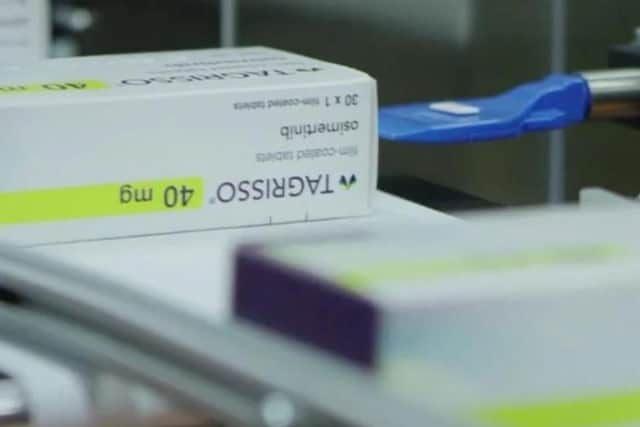Irish Sea border prevents approval in Northern Ireland of life-saving cancer treatment now allowed in Great Britain


Clearance for the treatment was given a week ago but the government did not spell out that this did not extend to Northern Ireland – nor did it make clear that the reason for this is the Northern Ireland Protocol.
The development is believed to be the first evidence of the new medicines border in the Irish Sea, something which has largely not been seen yet due to a grace period delaying its introduction until the end of this year.
Advertisement
Hide AdAdvertisement
Hide AdMultiple government departments and bodies contacted by the News Letter were less than forthcoming about exactly what had happened, with several saying that the drug would still be available in Northern Ireland and not highlighting that the treatment will be much harder to obtain here as a result of the protocol.


Last night Cancer Research UK said that many cancer patients in Northern Ireland will find it hard to understand why they have to wait longer for life-saving treatments which are available elsewhere in the UK.
Meanwhile, unionist leaders who have come together to legally challenge the protocol will today begin their judicial review in Belfast High Court.
In a statement last night, the applicants – Ben Habib, Baroness Hoey, Lord Trimble, Arlene Foster, Steve Aiken and Jim Allister – denounced “the imposition, without consent, of arrangements which leave Northern Ireland as a rule taker of foreign laws - over which we have no control” and “the United Kingdom partitioned down the Irish Sea”.
Advertisement
Hide AdAdvertisement
Hide AdUntil Brexit, The Medicines and Healthcare products Regulatory Agency (MHRA) in London approved medical drugs for the whole UK.
However, the protocol means that Northern Ireland is now bound by the decisions of the European Medicines Agency (EMA), while the rest of the UK can make its own decisions.
In January the UK announced that it was joining other countries – including the US and Singapore – in ‘Project Orbis’, a fast-track approval process for promising new cancer treatments.
Last Friday the MHRA announced that the first UK approval under that scheme had been given, with clearance for the drug Osimertinib – marketed under the name Tagrisso, a post-surgery treatment for lung cancer, to be used in early stage lung cancer treatment.
Advertisement
Hide AdAdvertisement
Hide AdThe MHRA said that the extended licence for the use of the AstraZeneca medicine “offers a novel treatment option for these patients, after their cancer has been surgically removed, in an area of significant unmet need”.
In a press release last week, Health Secretary Matt Hancock said: “It is absolutely vital that NHS patients have access to the most promising, cutting-edge treatments as quickly as possible.
“Leaving the EU presented us with the opportunity to join Project Orbis – an international collaboration with the top regulators around the world - to speed up the time it takes to get these new medicines to patients.”
However, he made no mention of Northern Ireland being left out of what he said was “absolutely vital” for the rest of the UK.
Advertisement
Hide AdAdvertisement
Hide AdThe EU’s EMA has indicated that it is likely to approve the treatment, meaning that if that happens quite soon the delay for Northern Ireland may be short. However, the case highlights that every time a new drug is approved in London it will not automatically mean that it is approved in Northern Ireland.
When asked about the issue, the MHRA confirmed that “any extension to the licence of Osimertinib (Tagrisso) in Northern Ireland must be authorised via the EMA’s centralised procedure which would automatically have effect in NI”.
It said that the drug “is available for all NI patients who will benefit from this treatment at the oncologist’s discretion while authorisation by the EMA is finalised”.
Stormont’s Department of Health similarly said that “patients in NI may still be able to access Tagrisso for this additional indication following a discussion with their clinician, in line with extant processes for access to new medicines.”
Advertisement
Hide AdAdvertisement
Hide AdHowever, that is a far more complicated and time consuming process, requiring individual applications by doctors to use an unapproved treatment.
The News Letter asked Sir Jeffrey Donaldson and Edwin Poots for their views on the issue. Neither responded.
TUV leader Jim Allister, who was one of the first to raise concerns about the medicines border, said: “Now, surely, all will see that the protocol is literally bad for your health.”
He said that for a life-saving treatment to not be approved in Northern Ireland “because we have been left under the control of the EU Medicines Agency and denied what our fellow UK citizens can avail of, then, the iniquity of the protocol is in plain sight for all to see.
Advertisement
Hide AdAdvertisement
Hide Ad“Not only has our equal citizenship been trashed but the health of our cancer patients is jeopardised.”
A blow for patients, says leading cancer charity
Northern Ireland cancer patients will struggle to understand why they are not getting the same access to new treatments as other UK citizens, a leading cancer charity has said.
Margaret Carr, Cancer Research UK’s public affairs manager in Northern Ireland, told the News Letter: “Because Project Orbis agreements apply only to GB, in most circumstances cancer drugs approved through this route may not be immediately available in Northern Ireland.
“Further regulatory approval by the EMA is required before some new cancer drugs can be offered to patients here.
Advertisement
Hide AdAdvertisement
Hide Ad“The divergence of regulations between GB and NI will potentially have implications for approvals of some new cancer drugs in the future.
“Many cancer patients and their families in Northern Ireland will find it difficult to understand why they might have to wait longer for life-saving treatments compared to patients in other parts of the UK.”
She added: “We must ensure that every effort is made for promising new cancer drugs to receive regulatory approval quickly, so that people living with cancer here can get the best possible treatments which will help them to spend more time with their loved ones.”
When Robin Swann’s Department of Health was asked if it had any concerns at Northern Ireland’s exclusion from approval for the treatment, it said nothing to indicate that it was concerned.
Advertisement
Hide AdAdvertisement
Hide AdInstead, the department said that the drug was approved for another type of treatment in Northern Ireland – something which predates Brexit.
It said that the reason the new treatment had not been extended to Northern Ireland was that “from 1 January 2021 any extension to a medicines licence in Northern Ireland for a product authorised via the EMA’s centralised procedure must first be authorised by the EMA and would automatically have effect in NI.
“The EMA’s Committee for Medicinal Products for Human Use has recommended granting this authorisation and a final decision is expected shortly.”
Lewis gave pledge on NI access to medicines
Just two months ago, in comments made to the News Letter but not published until now, Secretary of State Brandon Lewis said that the government was committed to ensuring that life-saving drugs available in Great Britain were also available to patients in Northern Ireland.
Advertisement
Hide AdAdvertisement
Hide AdIn an interview with the News Letter, he was asked if he could give a commitment that none of the drugs available in GB would be banned from crossing into Northern Ireland once the grace period expires at the end of this year. Mr Lewis responded that it was “quite a detailed, technical thing” but that the government was working on it.
When asked if the government would not accept a situation where a life-saving drug was available in GB but banned from coming into NI, he said: “That’s absolutely the position that we’ve got to ensure is there so that anybody in the UK is able to get the right medical treatment right across the board. Arguably we saw the reverse of that with what the EU tried to do with vaccines [threatening to trigger Article 16].
“There’s no way that communities would accept that -and rightly so.
“That’s a cross-community issue ...the entire community in Northern Ireland want these issues ironed out in a way that works so that consumers in Northern Ireland should have these things that they should have as a member of the United Kingdom.”
READ MORE:
Advertisement
Hide AdAdvertisement
Hide AdAdvertisement
Hide AdAdvertisement
Hide AdSam McBride: How Arlene Foster fell: Even as she dismissed the threat, the knives were being plunged
Advertisement
Hide AdAdvertisement
Hide AdLeaked internal DUP minutes show fear of looming electoral collapse, and dismay at party’s direction
Advertisement
Hide AdAdvertisement
Hide Ad——— ———
A message from the Editor:
Thank you for reading this story on our website. While I have your attention, I also have an important request to make of you.
With the coronavirus lockdown having a major impact on many of our advertisers — and consequently the revenue we receive — we are more reliant than ever on you taking out a digital subscription.
Subscribe to newsletter.co.uk and enjoy unlimited access to the best Northern Ireland and UK news and information online and on our app. With a digital subscription, you can read more than 5 articles, see fewer ads, enjoy faster load times, and get access to exclusive newsletters and content. Visit https://www.newsletter.co.uk/subscriptions now to sign up.
Advertisement
Hide AdAdvertisement
Hide AdOur journalism costs money and we rely on advertising, print and digital revenues to help to support them. By supporting us, we are able to support you in providing trusted, fact-checked content for this website.
Alistair Bushe
Editor